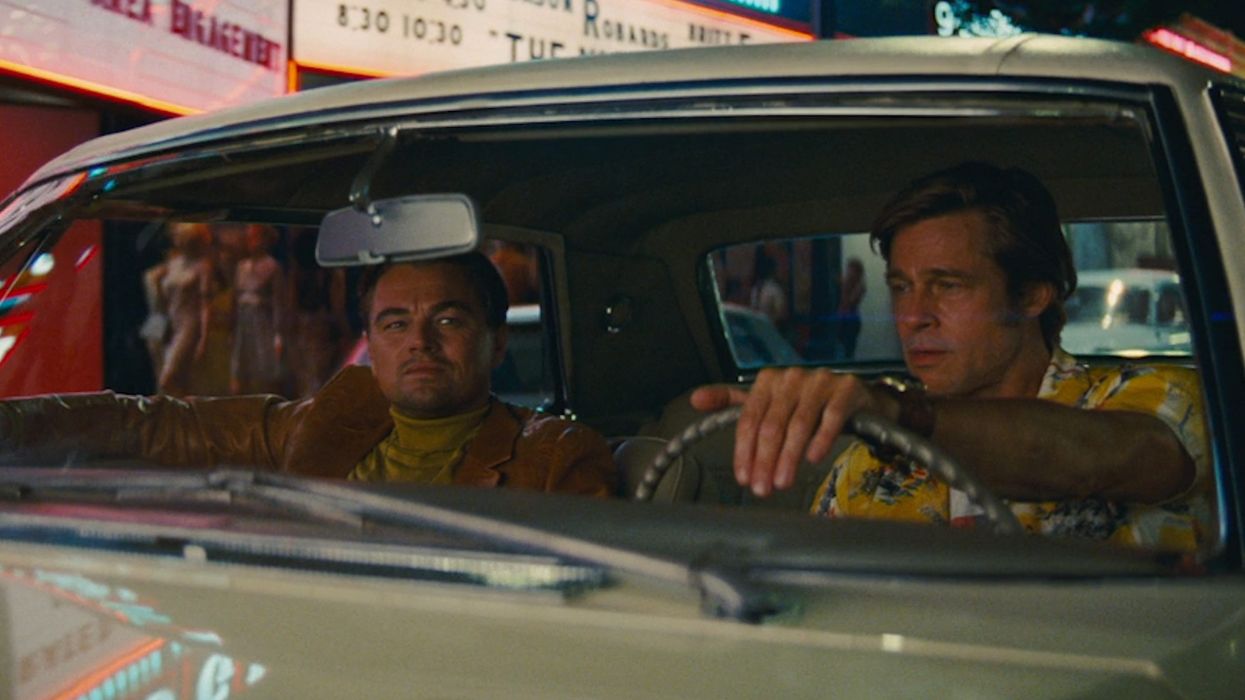Why 'Once Upon a Time in Hollywood' Is Tarantino's Love Letter to Filmmaking
The cast and crew of Once Upon a Time in Hollywood share details of how Quentin Tarantino brought his "love letter to Hollywood" to life.

It was clear from early on that Quentin Tarantino was obsessed with film. He wrote his first screenplay, Captain Peachfuzz and the Anchovy Bandit, when he was just 14. He got a job after dropping out of high school as an usher at the Pussycat Theater in LA. In the 80s, he worked at a video store in Manhattan Beach, CA where he was able to bolster his encyclopedic knowledge of films from all directors, genres, and time periods.
And his cinephilia isn't only evident in the experiences of his past but also in the films he makes, which evoke his passionate love for the film industry—the history, the traditions, and the evolution. No film captures this quite as well as his latest project Once Upon a Time in Hollywood.
In a new featurette released by Sony Pictures, the cast and crew of the film, including Leonardo DiCaprio, Brad Pitt, Margot Robbie, and the director himself, explain in great detail how Tarantino's love affair with cinema helped transform Hollywood back into the exciting showbiz town that it was back in 1969.
We know that Tarantino loves filmmaking, but what about Once Upon a Time in Hollywood makes it a love letter to the craft?
Attention to Detail
One thing that left an indelible mark on Margot Robbie's experience working on the set was just how detailed it was. From the cars to the clothing, the public benches and the theater marquees, the music and AM radio shows, everything was true to the time period and allowed the film's actors to become completely immersed.
Tarantino could've used blue screen or green screen and composited whatever 1960s assets he needed, but he didn't. He was tender. He recreated Hollywood in real life, allowing those who were close enough to touch, walk on, or even just look at the sets a brief moment to live in and experience a time in the town's history that made such a big impact on not only the film industry but also him as a filmmaker.



Times, They Are A-Changin'
Tarantino puts us right on the edge of the transition from Old Hollywood to New Hollywood—from glamorous starlets and powerful producers to raw storytelling and hungry directors. The American New Wave of the 60s saw young filmmakers fighting to tell the stories they wanted to tell, most notably Dennis Hopper with Easy Rider, George Romero with Night of the Living Dead, and Mike Nichols with The Graduate.
We're able to watch this change in real-time as Rick Dalton's brilliant light sparked by the epic westerns of yesteryear begins to fade into televised obscurity. We're able to grieve with him as he bears the crushing weight of failure on his shoulders. We're able to feel his isolation as the pages of history begin to turn with him trapped in the margins, unable to find enough relevance within himself to become the ink that will write the next chapter of film history.
Tarantino very much represents the spirit that made New Hollywood become a film movement: independence, risk-taking, rebellion. However, it's clear that he respects and even loves the leading men who couldn't quite find their tickets when New Hollywood left the station, the real-life Rick Dalton's of the era like Ty Hardin, George Maharis, and Edd Byrnes, all running like hell to catch the train but ultimately being left behind.

More Than a Love Letter
Fans of Tarantino know that Once Upon a Time in Hollywood is the second to the last film the director says he'll make in his lifetime. This means that not only are we going to be saying goodbye to one of the greatest filmmakers of our time but he'll be saying goodbye to an art form that he loves more deeply than many will ever know.
In that way, Once Upon a Time in Hollywood is not just Tarantino's love letter to Hollywood, it's his bittersweet kiss goodbye.
We still don't know what the director's 10th and final film will be, but if this film is any indication of how he's ultimately going to close the book on his filmmaking career, be prepared for an epic ride off into the sunset.
Source: Sony Pictures Entertainment











